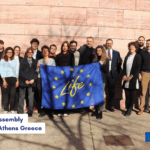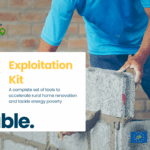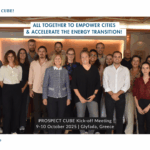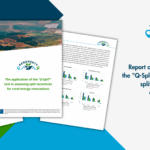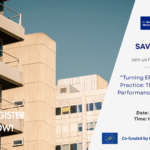Our Technoeconomics of Energy Systems laboratory (TEESlab) participated in the 18th Annual Meeting of the Integrated Assessment Modeling Consortium (IAMC 2025), held on 11–13 November 2025 in the municipality of Búzios, in Rio de Janeiro, Brazil. This year’s annual event brought together once again researchers from around the world to exchange knowledge and push the boundaries of climate, energy systems, and integrated assessment modelling, while, also, exchanging novel insights on the evolving priorities shaping future climate and energy research. Our team had a strong presence, contributing to sessions on national mitigation strategies, decarbonisation in the buildings sector, and equity and just transitions.
In particular, Professor Dr. Alexandros Flamos presented our latest work under the IAM COMPACT project, focusing on national-level mitigation strategies in the Greek residential sector. His talk explored how bottom–up demand–side modelling (DREEM model) can support real–world policymaking and accelerate deep emissions reductions. He emphasised that proven, cost-effective technologies already exist to support rapid emissions reductions, stressing the importance of collaborative research and open dialogue within the IAM community.
Dr. Vassilis Stavrakas presented a recent collaborative work of our team’s, in the context of the IAM COMPACT project, on top-down and bottom-up modelling of decarbonisation trends in the buildings sector at both the global and the EU levels. His presentation explored current and future pathways for reducing emissions, supported by collaborative work with international partners and models.
Finally, Mr. Nikos Kleanthis contributed to the session on distributional aspects of mitigation strategies at both the international and national levels. He presented our work on coupling transformative scenario design, bottom-up energy modelling, and distributional impact assessment to quantify inequality and energy affordability trends across income groups in different energy transition pathways in the power sectors. Findings show that the energy-burden gap between the lowest- and highest-income groups can narrow under decentralised energy planning alternatives, especially when citizens unite in the collective effort against the climate crisis.
You can find more information about our modelling work here and here.
Special thanks to our Brazilian colleagues from COPPE / UFRJ and Cenergia Lab, and to the entire IAMC organising committee for hosting such a well-organised and inspiring event!
We look forward to contributing to next year’s discussions during the IAMC 2026 annual event in Athens!


